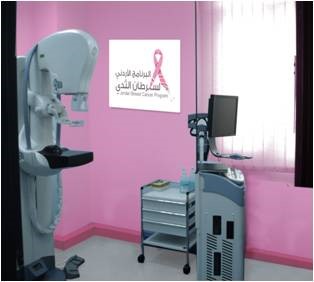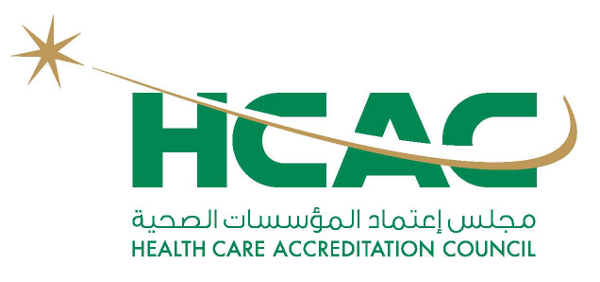Service Delivery
In cooperation with its partners, the Jordan Breast Cancer Program (JBCP) aims to increase the availability, accessibility and usability of quality screening services for all women in Jordan. This is achieved through a combination of Infrastructure Development, Human Resources and Capacity Building, and Screening Services.
Infrastructure Development
JBCP aims to improve access to quality breast cancer screening and early detection services. This involves the establishment of new mammography units, as well as the activation or continuous upgrade of existing units across all sectors, whether public, private or non-governmental.
The upgrade of current units comprises various components. Units are provided with important equipment including quality control kits to initiate quality control testing and optimize image quality, mammography-specific viewers, and other accessories such as mammography cassettes.
They are renovated to create a pink branded comfortable and welcoming examination environment with private changing room. Units are also supplied with educational posters and leaflets to spread positive messages about breast cancer screening and early detection in local communities.

Human Resources and Capacity Building
JBCP works to build and enhance the capacity of breast imaging units’ and human resources by providing continuous training, conferences, seminars, scientific evenings. These efforts target radiologists, radiographers, physicists, medical engineers, nurses and specialists from various disciplines in the field of breast imaging and early detection.
Observer ships at the King Hussein Cancer Center (KHCC) are typically four-weeks long. For radiologists, the observer ship involves comprehensive training on the fundamentals of mammography. It is designed to advance radiologists’ knowledge on the multimodality imaging approach in the evaluation of breast symptoms, and to enhance the concept of multidisciplinary discussion in the management of breast diseases.
Radiographer’s trainings aim to advance their knowledge and skill in mammography, and enable them to perform high quality mammography. The training course focuses on positioning, quality control, and radiation protection, also introduces trainees to multimodality breast imaging and interventional procedures of the breasts. Upon completion of the program, radiographers are skilled at safely performing mammography with the best image quality.
JBCP continues to hold specialized conferences, seminars and workshops on regular bases, bringing together all partners involved in the fight against breast cancer to learn together and from one another, discuss updates, and share experiences and best practices.

Screening Services
The provision of screening services to underprivileged women continues to be a priority for the JBCP. There are numerous special projects that run during JBCP’s major awareness campaigns in October and March, as well as throughout the year that raise funds for the provision of free screening services to women who are uninsured or cannot afford the cost of the exam. Profits from the sale of JBCP’s memorabilia also go to the provision of free mammograms for underprivileged women.
To serve remote areas across the Kingdom, JBCP secured two mobile mammography units with up-to-date equipment and qualified trained staff. They can be reallocated to different governorates depending on public needs. Units are electronically connected to KHCC, which facilitates their operation as satellite units. The screening service provided aboard the mobile mammography unit is fully covered as well as follow-up tests if needed until a definite diagnosis or a rule-out is reached.

Radiologic Technologists Mammography Manual.
Among the topics addressed in the manual are Breast Anatomy, Physiology and Pathophysiology, Mammographic Physics and Equipment, Breast Imaging Reporting and Data System (BI-RADS), Introduction to Mammography Quality Control, and Radiation Protection in Mammography.

Trainings and workshops
JBCP frequently holds quality control trainings and workshops, guided by national and international experts, which cover the theoretical and practical parts of breast imaging quality control tests. These sessions are attended by radiographers, medical physicists, radiologists and medical engineers from across all sectors, and are held in different healthcare settings with varying mammographic modalities (analogue, digital). This helps improve the knowledge and skills of participants thus promoting the quality of services provided.

Certification
In partnership with the Health Care Accreditation Council (HCAC), JBCP developed Breast Imaging Units’ Certification Standards to ensure and promote a high quality of breast imaging services. As the first of their kind in Jordan and the region, these standards provide optimum levels of performance, and maintain high quality screening and diagnostic results. The standards have been made consistent with other nationally agreed-upon guides
The standards are organized into key functions referred to as “Clusters,” which include Professional Performance Standards, Clinical Performance Standards, Quality Management Standards, and Medical Records and Information Management.
Any unit that offers breast imaging services (screening and/or diagnostic) is eligible for seeking the Breast Imaging Unit Certification Standards. JBCP works with, and supports, mammography units in the public, private, military, university, and non-governmental sectors to undergo the certification process. It do so by offering the required training for the unit’s staff in breast imaging techniques and quality control systems, in addition to assisting units in developing the policies and procedures, protocols, and guidelines necessary to meet these standards.




